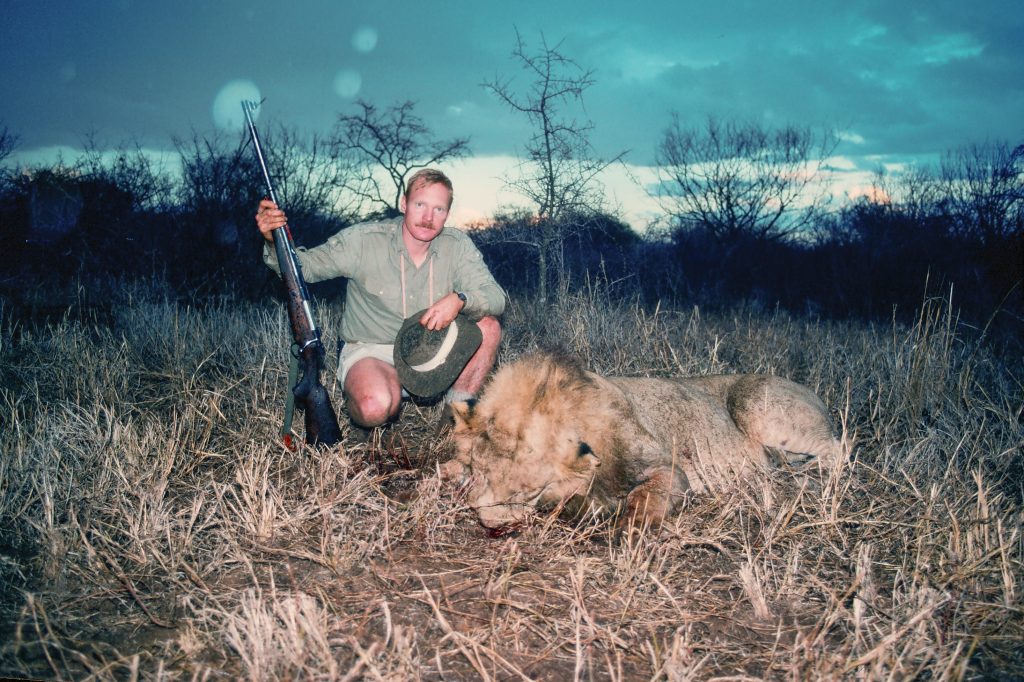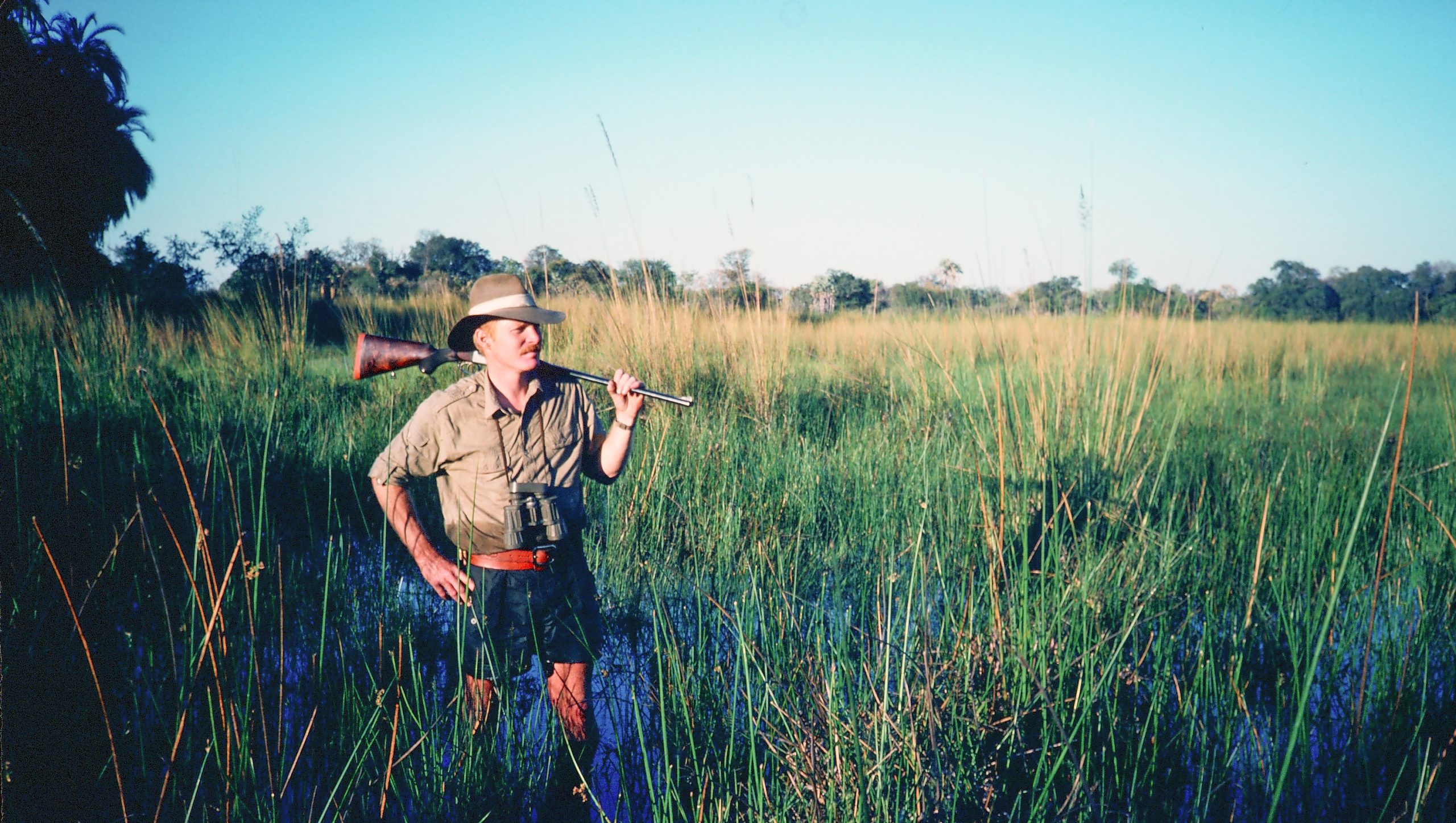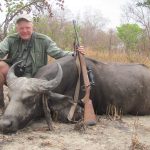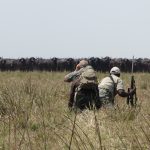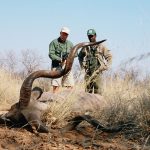International hunting travel is different, but still possible, in the era of COVID.
Photo above: Boddington tracking buffalo between palm islands in Botswana’s Okavango Swamp in 1985. Botswana is open, and elephant hunting will resume this year. Unfortunately, there is no longer any hunting in the Okavango.
My rationale (“excuse,” if you prefer) for my first safari was to get Africa out of my system once and for all. It didn’t exactly work out that way. Africa has a way of grabbing you and not letting go. In the forty-four years since that first African experience, I can almost count on the fingers of one hand the years I haven’t hunted somewhere in Africa.
When I was younger, there were a few years when I couldn’t afford it. I also took a couple years off so I could make appearances in the Gulf Wars. Otherwise, I’ve been to Africa almost every year, and enjoyed every minute of it.
One of the years I didn’t get to Africa was our unlucky and unlamented 2020. I had plans, for sure, but they dissipated in the viral-laden mist. But it hasn’t been the end of the world. I’ve had the rare opportunity to reset a bit and reflect on past hunts, even spend time going over old photos. In the era before digital cameras, I spent thousands of dollars annually on film and processing. When I went digital those costs vanished, but I had thirty years of black and white proof sheets and thousands of slides in file cabinets. I’d like to say they were perfectly organized, but why lie?
I hope most of us had “pandemic projects” to keep us occupied as this thing dragged on, stuff we’ve put off (for years). I had some good ones: I built a shop and set up a new reloading bench, with the opposite end for studio photography. Another project: I went through all the old photo files, and I found good images I hadn’t seen in years. At the end, I had several hundred slides scanned at high-res, now added to digital storage. These were from all over, not just Africa, but many were from safaris long past, some in areas no longer available, and with absent friends.
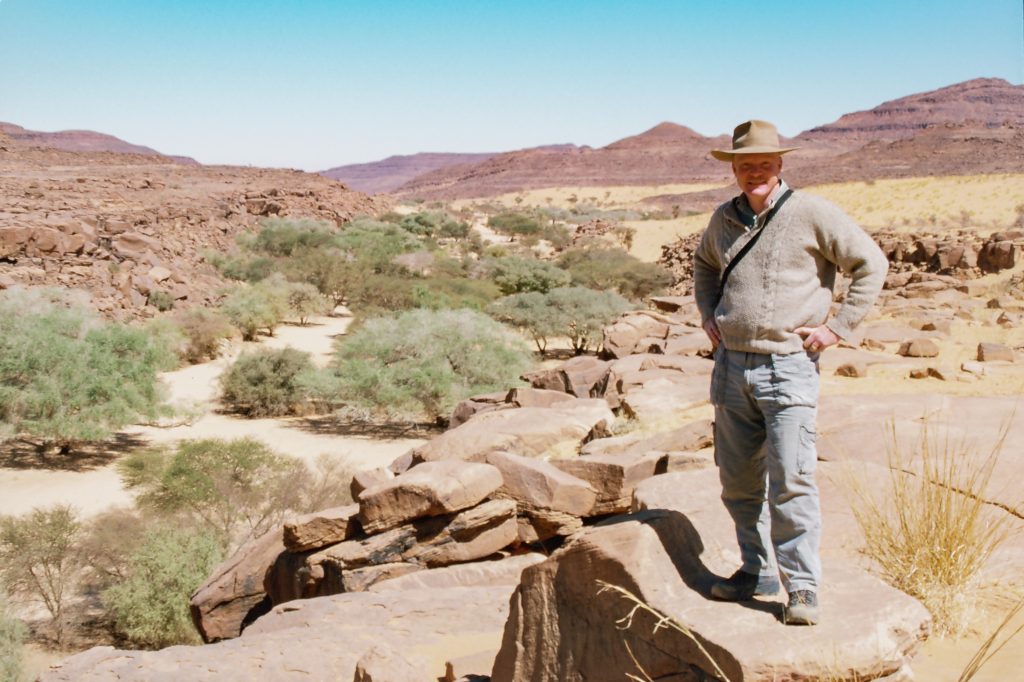
They brought back a lot of fond memories. I’m fortunate to have a lot of great African memories to fall back on. I can’t imagine how I might feel if 2020 was supposed to be the year that I took the Great Plunge and embarked on my first safari, only to have it snatched away. Many were in that boat, and I’m sorry.
Fortunately, Africa and her wildlife are still there, and the life-changing experience of safari still awaits. At this writing, Africa is reopening fast. My crystal ball is no better than anyone else’s, but I expect travel and access to steadily improve. Some countries are fully open (sort of); others with more restrictions.
We all have different views of pandemic politics, and COVID-related risk assessment is a personal thing. However, if we wish to get on with our lives (and if our lives include travel), there are real considerations to deal with. I didn’t get on a commercial flight for ten months. When I did, I was required to wear a mask. I took a “selfie” and posted it, and one of the first comments I got went something like “How could you buy into this stuff? I have lost all respect for you.”
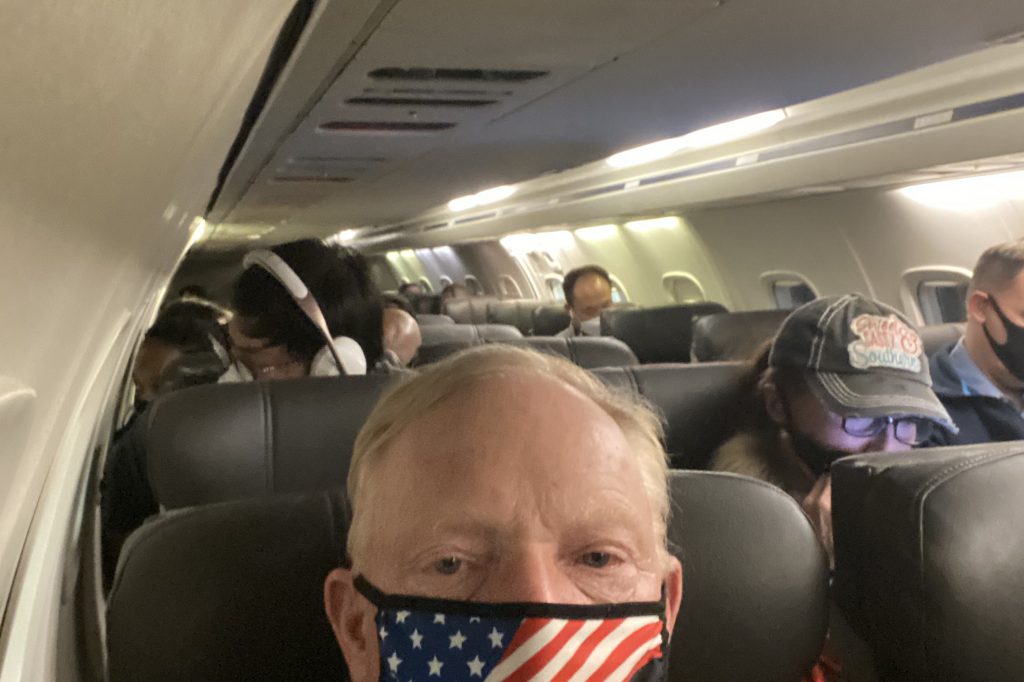
Well, if you choose to stay home, that’s your decision. Depending on age and health, some of us should stay home for a while longer. But, if you choose to travel, you will wear a mask on common carriers; you won’t board without face covering, and you’ll keep it on. I find the mask claustrophobic, but you get used to it, and in public, in much of world (and on public carriers), masking is now simply a fact of life.
So is testing. In order to fly internationally, at this writing you must have a negative PCR Covid-19 test—within a specified time frame—in order to board. (72 hours before departure seems most common, but this varies and is subject to change.) You must also have another negative test (also with a time limit) to get back into the U.S.
These are things you must think about and plan for, and, although nobody likes to hear this, you must be a bit flexible. In February, Donna and I had a trip planned to Uganda, rescheduled from last year, and we were looking forward to a great buffalo hunt. We watched the Super Bowl at a neighbor’s house, just four people in a large room, no raucous gathering, everybody healthy. Out of the blue, one of them came down with COVID. Suddenly, we weren’t going to Uganda. It’s irresponsible to travel if you know you’ve been exposed. You don’t want to pass it along but, even if you prefer to be completely selfish, do you want to be ill in a foreign country, and have to quarantine there in order to get home?
These are practical concerns. We did get tested, remained negative, and rescheduled our trip for mid-March. So, hopefully, while you’re reading this, we’ll be stalking buffalo on a hot, sunny day in Karamoja. But we have to run the viral gauntlet once more. The airlines are good about rescheduling, but these days one shouldn’t even think about non-refundable or non-changeable tickets. The virus is still out there, and there’s no guarantee a test will come back negative. Also, the time-date-stamped test results are unarguable. Time required to get test results varies with area; it’s essential to do your homework and get tested so that you can get the results back before your flight but, as with the test itself, there’s no guarantee. Be flexible!
Same thing on the other end: You must be sure you can get tested and get results before you head home. This is just one more logistical challenge hard-pressed outfitters must solve, and they are. After a terrible 2020, operators able to resume are fully aware of this requirement and figuring out the best and surest ways. Just ask the questions before you go, and be certain of the answers.
Travel routing has also changed, and will continue to change. I’m writing in late February, still early in the game. South Africa officially opened to travel on October 1, 2020. In southern Africa, Botswana, Mozambique, Namibia, Zambia, and Zimbabwe are also open. This is great news. However, at this writing, U.S. citizens are still not allowed to travel in or through various European countries. Flights and potential routes are thus much more restrictive! In this infancy of reopening, flights through the Middle East have been popular, and our routing to Uganda is Turkish Air through Istanbul (a great airline for travel with firearms).
From a practical business standpoint, airlines must view travel restrictions as opportunities (as well as barriers). They are working aggressively to open new routes, but this takes time. As the year unfolds, there will be more direct flights into Windhoek, and I just learned that Air Ethiopia (another fine carrier) is opening a direct flight from Addis Ababa to Beira in Mozambique. For safari travel, I have always recommended using an experienced gun-savvy travel agent. In these times of COVID, with things evolving quickly, this is even more important.
If you lost a safari last year, don’t give up. Things are improving, and as the vaccine(s) become more widespread, the curve should accelerate. Whether we make it to Uganda this month depends on the vagaries of a tiny little virus, but, for sure, I won’t go through 2021 without getting my “Africa fix.” This will be a great safari season!
